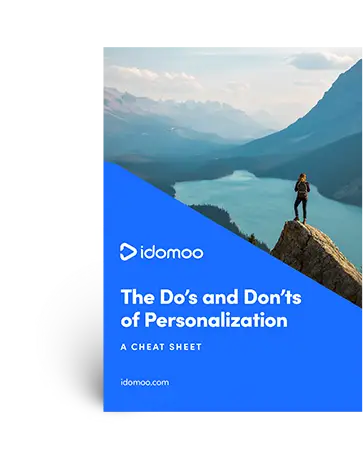Let’s face it — running an ecommerce business is difficult. From differentiating yourself from the competition to marketing operations to selling and shipping, there’s a lot to think about.
One tool that more and more business owners are employing to set themselves apart and grow their ecommerce operations is AI personalization. AI personalization is changing the way businesses engage with current customers and attract new customers. AI makes it possible to create tailored experiences and personalize outreach and marketing collateral.
Let’s Rewind: What Is Personalization, Anyway?
Before we dive into the depths of AI, let’s first set the foundation. What is personalization?
Personalization is when you use data to provide your customers with a brand experience that’s tailored to their unique preferences and relevant to their interests.
We’ve all received emails that include our first name or been served ads for something we were just looking at (and subsequently wonder how they knew we were interested in a niche brand of pool floats…), but personalization goes further than that.
Businesses can use personalization to optimize employee onboarding, churn prevention, upselling existing customers, customer service and much more.
No matter how you use it, there’s no denying that personalization works.
- McKinsey & Company found that companies with an excellent personalization strategy earn 40% more revenue than those that don’t.
- Video is 3.5x more likely to make someone become or remain a customer when it’s personalized.
- Over a quarter of marketers say that they saw 3x-5x ROI on their personalization efforts.
The downside of personalization is that historically, it’s been time-consuming and difficult to implement. But with the advancement of AI, personalization for ecommerce is quicker, easier and more efficient than ever.
What Is AI Personalization in Ecommerce?
AI personalization in ecommerce refers to the use of artificial intelligence techniques to create customized shopping experiences for individual customers. This involves leveraging customer data about behavior, preferences and interactions to provide tailored recommendations, offers, content, and customer experiences.
Here are a few use cases where AI helps with ecommerce personalization:
Customer Data Collection and Analysis
- Companies can track user behavior, including how customers navigate the site, what products they view, and their purchase history.
- They can collect demographic data (age, gender, location, etc.).
- They can analyze customer reviews and ratings for insights into preferences and sentiments.
Machine Learning Algorithms
- Companies can use collaborative filtering, content-based filtering, and hybrid methods to suggest products that customers are likely to be interested in.
- They can also use predictive analytics to forecast future behavior and trends based on historical data.
Natural Language Processing (NLP)
- AI chatbots can provide personalized customer service and support by understanding and responding to customer queries.
- Companies can use sentiment analysis to understand customer sentiments from reviews and social media to improve product offerings and customer interactions.
Examples of AI Personalization
AI personalization is transforming the way businesses interact with customers, creating tailored customer experiences that enhance customer engagement and satisfaction.
Here are a few AI personalization examples in action.
Personalized Website and Mobile App Experiences
AI can analyze user behavior and customer preferences to dynamically adjust website content.
- An ecommerce website might show different homepage banners, product recommendations and special offers to each visitor based on their browsing history, purchase history and demographic information.
- Websites can use AI to track user interactions in real-time and adapt content accordingly to improve conversion rates.
- Ecommerce websites can personalize content based on the user’s location using AI personalization.
See it in action: Booking.com
Travel website Booking.com uses AI-powered personalization to provide unique recommendations and accommodation options to their users with their new AI Trip Planner. AI Trip Planner is powered by large language models (LLMs) and Booking.com’s existing machine learning models that provide recommendations to millions of travelers every day.
Personalized Email Content
AI helps in segmenting email lists more effectively by analyzing data and customer behavior and identifying patterns. This allows businesses to send highly targeted emails to specific segments to create a personalized customer journey.
- A clothing retailer can send different emails to customers based on their purchase history, preferences and seasonal trends.
- If a user often opens emails with discount offers but rarely engages with new product announcements, AI can prioritize sending promotional emails with special offers to that user.
See it in action: Iterable
Iterable is an email marketing platform that analyzes customer data using AI to send highly-targeted marketing messages. They deliver differentiated and delightful experiences for customers using AI-driven email marketing.
Personalized Product Recommendations
Personalized product recommendations are where AI can really shine.
- AI personalization tools recommend relevant products by analyzing the behavior and preferences of similar users.
- AI can recommend products based on the items a user has previously interacted with. For example, if a customer frequently buys eco-friendly products, the AI-powered personalization will prioritize showing similar sustainable items.
See it in action: Amazon
With all of their advanced algorithms, Amazon is the poster child for AI personalization in online shopping. They use machine learning and various data points such as past purchases, browsing history and items frequently bought together to drive their recommendation engine and suggest products that they think we’ll like.
Post on
AI-Powered Chatbots
AI-powered chatbots provide immediate, personalized customer support by understanding and responding to user inquiries in real-time. They use natural language processing to understand and engage in human-like conversations, offering solutions based on the user’s specific needs and previous interactions.
- If a customer frequently inquires about order status, the chatbot might proactively offer updates or expedite support for related issues.
- A beauty brand’s chatbot might ask about the user’s skin type and preferences, then recommend suitable products accordingly.
See it in action: Redfin
Buying or renting a home requires a lot of research. Redfin saw an opportunity to have AI help answer user queries with a custom AI chatbot called Ask Redfin. The chatbot can answer all kinds of questions about square footage, amenities and home features.
Since its launch, Redfin has found that 93% of Ask Redfin users come back to the app within a week.
Dynamic Pricing
AI-driven dynamic pricing adjusts the cost of products and services in real-time based on supply, demand, competitor pricing, and other market conditions. This ensures that prices are always optimized to maximize revenue and competitiveness.
- AI can segment customers based on their purchasing behavior, loyalty and price sensitivity, allowing businesses to offer personalized pricing. For example, frequent buyers or loyal customers might receive exclusive discounts, while new customers might be offered introductory rates to encourage conversion.
- Retailers can use AI to adjust prices during specific seasons or events. For example, prices for winter clothing might be higher during the peak of the season and lower during the off-season.
- AI algorithms continuously monitor competitors’ prices and adjust accordingly. An online retailer might lower prices in response to a competitor’s sale, or increase prices when the competition is out of stock.
- AI can tailor discounts and special offers to individual customers based on their purchasing history and behavior. For example, if a customer frequently buys a particular brand, the AI system might offer a discount on that brand to encourage repeat purchases.
See it in action: Uber
Uber employs AI for dynamic pricing by continuously monitoring real-time data, including ride requests, driver availability, geolocation, traffic, weather and local events. Machine learning algorithms predict supply and demand patterns, adjusting fares accordingly to balance the two.
Uber’s AI systems continuously learn and adapt from new data, refining predictive models and pricing algorithms to maintain optimized and fair pricing.
Personalized Marketing Campaigns
AI-powered personalization can segment customers based on their behavior and preferences, enabling businesses to create targeted marketing campaigns. By using predictive analytics, businesses can send personalized emails, notifications, and advertisements that are more likely to engage customers and drive conversions.
See it in action: Spotify
One thing Spotify has become known for in recent years is their comprehensive Spotify Wrapped year-in-review campaign. This campaign leverages machine learning to analyze vast amounts of user data, including songs, artists, genres and listening times. The insights are then used to create a unique and engaging experience for each user.
Year-in-review content takes personalization to the next level and is great for both customers and companies. Our clients’ year-in-review campaigns have resulted in a 68% increase in sales, among some other awesome metrics. Check out this year-in-review video recap we made for Delta Air Lines’ top Medallion Members.
The Best of Both Worlds: AI Personalization and Video
Ecommerce companies that want to take their messaging to the next level can also unlock the ultimate AI personalization medium: video.
Video is a powerhouse when it comes to brand sentiment, referrals, customer retention, sales and customer loyalty.
- People spend about 1.4x more time on pages with video than without.
- Nearly 50% of internet users looked for online video related to a product or service they were interested in before visiting a store.
- 74% of marketers say video has a better return on investment than static imagery.
- Videos drive organic traffic because they can be shared on social media platforms like Facebook, Instagram, TikTok, X and LinkedIn.
Now, take it one step further with personalization. Personalized Video is:
- 4x more likely to make a customer feel valued by a brand
- 3x more likely to make a customer trust a brand
- 3x more likely to make a customer recommend a brand
And using personalized content, ecommerce businesses can create AI videos at scale. Here’s a personalized greeting video made with our AI in minutes from a simple text input, no video technical skills needed.
Instead of taking months to make a video, with AI, you can create a video on demand in moments — sometimes under a minute. That means that personalization isn’t just something to dream about or plan for when you have the resources (someday). You can personalize your videos right away and use them to stand out.
AI Personalization for Your Ecommerce Business
Ecommerce businesses can enhance their customer experience and set themselves apart with AI personalization. From providing personalized experiences based on their behaviors and preferences to delivering them personalized content like videos, the possibilities are endless.
To learn more about how Idomoo can help you personalize your video efforts with AI and grow your ecommerce business, click the button below to schedule a call. We’d love to show you how it works.






